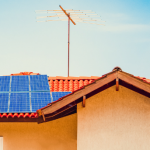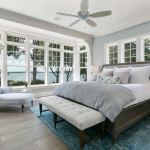10 things to consider when installing an air conditioner in your home
We all have different requirements when choosing an air conditioner
- A home owner wanting to install a state-of-the-art air conditioning system to add value to the property
- A tenant in a small apartment wanting a small and simple solution to cool or heat 2-3 rooms
- Living in a hot and humid location you may only need the cooling function
- Living in a cold and damp location you may the heating function as well as cooling in Summer
- Living where it is mainly cool and dry you may want heating with humidity too
The air conditioning team at Voltfix has come up with 10 things for consideration when installing an air conditioner in your home.
1. There are many types of air conditioners. Which one should I get?
- Window Units are suitable for single rooms. The window air conditioner has a single thermostat gauge and the components are enclosed in a box.
- Portable Units are freestanding air conditioners that sit on the floor, they can be moved between rooms.
- Split system Units are an outdoor condenser and compressor with an indoor unit for air handling. These air conditioners have attached blowers and are fixed on the wall. No ducting is required as there will be a different split system unit for each designated zone. Split systems are ideal to air condition just one room or a specified zone.
- Multi Split systems allow climate control of each room individually. Multiple indoor units can be connected together and use only one outdoor unit.
- Ducted (Central) systems consist of an outdoor and indoor unit with flexible ducting that sends the air to cool and heat all the rooms through vents. The rooms are uniformly air conditioned at the same temperature and settings. The indoor unit is hidden in the ceiling or underfloor.
2. Where do you live? Where to install the units? Location matters.
Australia experiences some of the hottest temperatures on earth, and some pretty cold temperatures as well. Modern air conditioning systems use advanced technology to absorb the heat from inside air and then dissipate the air outside. This leaves the interior of your home cooler. If you don’t experience the colder temperatures and do not require heating then select a cooling only air conditioner. Reverse cycle air conditioners both cool and heat your home. Most have an automatic defrost cycle, which means they operate effectively at cold temperatures as low as -10 degrees.
Internal units should be placed in rooms or zones where you spend the majority of your time. Outdoor units need to be positioned in a well ventilated area. When cooling, the outdoor unit will transfer the heat that was inside to the outside unit. If the outside unit cannot breathe it may overheat and not run efficiently. The outdoor units should also be installed as near as possible to the internal unit to minimise losses and maximise efficiency, best to keep this distance less than 5 metres if possible.
3. What size is the room? What size air conditioner should I purchase?
When talking about the size of the air conditioner we are not talking about the appliance dimensions, but rather it’s power in kW.
By selecting an air conditioner that is appropriate for the room size it will operate more efficiently. If oversized, the air conditioner wastes energy, if undersized it will struggle to maintain the required temperature and wear out sooner.
There are many factors to consider when choosing the size of the air conditioner:
- The room size where it will be positioned – the bigger the area, the larger capacity required
- The room insulation and wall composition – better ceiling and wall insulation then lower the capacity required
- The number and type of windows in the room – the size and insulating properties of the windows have more impact than the walls or ceilings. Large windows may mean you need a larger capacity as the room has less insulation to keep the warm/cool inside.
- The aspect of the room – east or west facing rooms may need larger capacity due to the heat from the sun
- The climate where you live – homes near the coast will require different capacity than inland suburbs or cities.
The following is a rough guide for which size system to purchase:
| Room Size | Type of Room | System size |
|---|---|---|
| 10-25 m2 | Study | Small lounge |Bedroom | Small office | Small kitchen |
2.6 kW |
| 25-35 m2 | Bedrooms with ensuites |Mid-size Bedrooms | Mid-sized kitchens | Mid-size lounges | Small rooms with high ceilings | Offices |
3.5 kW |
| 45-60 m2 | Bedroom with ensuites | Large bedroom | Large kitchens | Mid-size lounges | Mid-sized rooms with high ceilings | Offices |
5 – 6 kW |
| 60-80 m2 | Large open plan areas | Large lounges | Small shops | Offices |
7 – 8 kW |
4. What is your budget to purchase the air conditioner?
Air conditioning is a big investment to your home. Price is an important consideration, but so is the quality.
How long are you planning to stay in this house? If you are planning to relocate in the not-to-distant future then you probably don’t want to install an expensive ducted system, but if you are sticking around then it will add value and enhance your lifestyle while residing in the home.
You may be tempted to purchase the cheapest air conditioning system to save money. The more expensive systems usually work out to be more cost effective over time. They are usually better quality and have extended working life and longer warranties. They consume less energy to keep the rooms cool and lower your electricity bills. They should not require replacement or repairing as frequently.
Don’t forget to allow for installation costs in your budget. It is not recommended to install air conditioning systems yourself due to the risks involved, it is better to get the professionals in as they have all the necessary tools and components on hand to complete the installation quickly and efficiently.
5. What are the costs involved in running an air conditioner?
The main cost involved is the electricity bill to run the air conditioner.
The energy consumption measurement is in kw, but is a fraction of the cooling capacity rating. If you air conditioner has power consumption 0.5kW per hour, and you are using it for roughly 6 hours per day, then that would be 3 kW of power per day. For an average week we would multiply by 7 days, so 21kW of power per week. The to calculate the cost multiply by the cost per kW on your electricity bill, let’s say 25 cents and that gives us a cost of $5.25 per week to run the one air conditioner.
Your air conditioner will have to work harder when the outside temperatures are extremely hot or cold, so it will cost more during these times.
Having an energy efficient air conditioner will reduce the ongoing electricity costs.
Other expenses could include emergency repairs and cleaning and maintenance costs.
6. Why does energy efficiency matter? Why is Inverter technology an important consideration?
The easiest way to check the energy efficiency of the air conditioner is to look at the energy star rating. The more stars, the more energy you will save and the less it costs to run. Split systems are the most energy efficient. Reverse cycle have two ratings – blue for cooling and red for heating.
Good reasons to invest in a more energy efficient the air conditioner:
- Reduce electricity consumption and save $$$
- Better operation of equipment
- Less impact on the environment by reducing your home’s carbon emissions
- Less maintenance and longer lifespan
An inverter is the electronic component that alters the compressor speed. It regulates the compressor speed so it operates more efficiently. If the air conditioner uses inverter technology it will save energy. Inverter technology can reduce energy consumption by around 50% compared to conventional air conditioners.
7. Can air conditioners improve the air quality?
The air conditioner’s filter removes microparticles from the air, which means you are breathing cleaner air. The filters remove bacteria, mould, allergens, dust and odours from the air. This helps with conditions like asthma, allergies and hay fever.
Many systems now let you control the humidity in the room. This helps prevents medical conditions like dry skin, eyes and throats and makes it a lot more comfortable when sleeping with the air conditioner on.
Many systems also have a self cleaning function, which keeps the inside of the unit dry. This reduces the build up of dust and mould and keeps the unit running efficiently.
8. What features and functions do you need in an air conditioner?
Many air conditioner models come with extra features and functions. Decide which are important to you when you decide on the system to purchase.
- Connectivity to wi-fi smart device – this lets you use your smart phone to set the temperature in the home
- Presence sensor – directs air away from people in the room to avoid draughts and switches to an energy efficient mode when people leave the room for a period of time
- Swing mode and airflow – angle adjustment for vertical and horizontal air flow
- Noise reduction – some air conditioners have much lower noise levels than others. If this is important check the noise levels on the specifications.
- Sleep mode – an energy efficient feature to adjust temperatures while sleeping
9. What maintenance is required for air conditioners?
Once installed air conditioners generally tick along fairly well. Sometimes you need emergency repairs (after severe storms for example) where the system stops working. Call a professional to check everything over and make the necessary repairs to the system.
There are a few easy things you can do the maintain the condition and efficiency of your air conditioner.
- Change or clean the filter once each month. The air filter stops particles (dirt, dust, pollen) from infiltrating your room. It can only function efficiently when it is clean. When the filter is too dirty there will be excess strain on the air conditioner and affect the air quality in the home as well.
- The coils should be kept clean. Over time the coils can become dirty which will affect the amount of heat absorption, this means your system has to work harder to keep your home cool.
- Check the fins regularly. The condenser and evaporator both have fins. The fins can be bent and if this happens it reduces airflow.
- Inspection of condensate drain. This is the drain that allows the condensation created to flow outdoors. This can sometimes become clogged and cause drainage issues.
- Schedule regular maintenance and cleaning. It is recommended every 6-12 months to have a maintenance appointment to check everything is working correctly and cleaned thoroughly.






